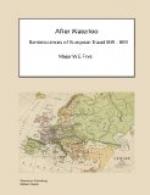VIENNA, Augt. 20th.
I have been to see Schoenbrunn, the usual residence of the young Napoleon; but he is now at Baden with the Imperial family, where his mother, who is lately arrived from Italy, is also on a visit. The young Napoleon is said to be a remarkable fine boy, and a great favorite with his grandfather the Emperor. Many are the anecdotes related of him. I shall mention one. He had heard so often talk of his father, that shortly after the arrival of his mother, he wished to see his father also and asked his attendants repeatedly and not in a very patient tone: Wo ist denn mein Vater?[124] This was told to his grandfather the Emperor; and he gave directions that the child should be brought to him, the very next time he should put the question. He then said to him: Du moechtestwissen wo dein Vater ist? Er ist in Verhaft. Man hat es mit ihm gut gemeint; weil er aber unruhig war, so hat man ihn in Verhaft gestellt, und Dich wird man auch verhaften, wenn Du unruhig bist.[125]
So much for this anecdote; but I did not hear what was the answer of the young prince. The young Napoleon is, it appears, a great favorite of the soldiers, who quite adore him, and he will sometimes go into the kitchen to get bread and meat to give to the soldiers on Guard at the Palace. A singular event happened lately to Maria Louisa. During her stay at Schonbrunn, her chatouille, with several things of value in it, bijouterie, etc., was stolen from her. She caused enquiries to be made, and researches to be set on foot. Nobody has been able to find out who took it; but it was put back in the precise place from whence it was taken, and not a single article of the bijouterie or things of value was missing. It is supposed this theft was made for political purposes, in order to discover the nature of her epistolary correspondence, if any existed. Had it been taken by a vulgar thief, it is not probable that the articles of value would have been restored. Such is the unhappy condition of that Princess to be always an object of suspicion and espionnage.




